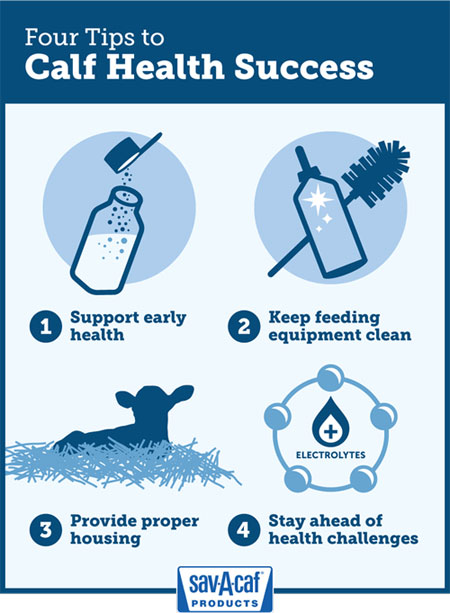 Four keys to calf health success
Four keys to calf health success
Raising new calves is an exciting, fun adventure. By ensuring a great start in the first weeks, you’ll help set the stage for growth and performance.
“Healthy calves in the first part of life may become less exposed to setbacks and health challenges later in life, which can result in optimal growth and lower management expenses,” says Julian (Skip) Olson, DVM, technical services manager for Milk Products.
Here are four keys to help your calves thrive:
1. Support early health
Nutrition plays a significant role in early calf health. Supplements are available to help you keep your calves feeling and performing their best.
“Whether you feed your calves whole milk or milk replacer, consider an additive that optimizes early calf health,” says Olson. “Look for one that delivers a source of live naturally occurring microorganisms. Beneficial bacteria have been shown to help maintain normal intestinal microflora and optimize digestion.”
Dried maternal colostrum can also help support calf intestinal health in the early stages of life. Some supplements will contain dried colostrum in addition to other beneficial ingredients.
“Including maternal colostrum beyond day one has been shown to help support digestive system health and immunity, resulting in optimal calf growth and overall health,” says Olson. “In addition to immunoglobulin G (IgG), colostrum supplementation provides many more substances that are of value to the calf – immunoglobulins and immunity-enhancing molecules, as well as vitamins, minerals, growth factors and hormones.”
2. Keep feeding equipment clean
Sanitation and maintenance of feeding equipment are also important for your calf’s health. If not regularly washed and sanitized, equipment can quickly become a harbor for bacteria.
Cleaning tips:
- Always use a separate bottle or pail for each calf
- Wash pails, bottles and nipples in hot, soapy water and rinse well after each feeding
- Allow equipment to dry thoroughly between feedings. Moisture can create an ideal breeding ground for bacteria. If drying conditions are poor, consider drying the equipment with a clean towel.
- Sanitize before use with an approved disinfectant. For example, chlorine dioxide is an effective sanitizer at a low concentration.
3. Provide proper housing
When it comes to housing, with some advanced preparation and supplies, you’ll be set to give new calves a strong start.
Keep these guidelines in mind:
- House calves in individual housing until weaning for the best chance of controlling disease spread from calf to calf
- Ensure adequate ventilation without direct drafts
- Provide and maintain a thick layer (6 to 10 inches) of clean, dry bedding of straw or shavings so the calf can easily nest into the bedding
- Prevent nose-to-nose contact
- Disinfect hutches or stalls thoroughly between calves
4. Stay ahead of health challenges
Part of raising calves is always looking ahead and trying to prevent stressful situations.
“As a calf raiser, part of your role is to pay close attention to temperatures shifts, extreme heat or cold, vaccination, transportation or weaning – all factors that can cause calves to experience stressful situations resulting in health challenges such as scours,” says Olson. “Feeding an electrolyte supplement ahead of these situations to avoid dehydration can help keep calves thriving.”
Electrolyte supplements can help support a calf’s immune system and keep them feeling their best. Be sure to offer electrolytes in addition to the calf’s normal diet, as electrolyte supplements do not contain all the nutrients of whole milk or milk replacer.
“A calf’s first few months lay the foundation for their future,” says Olson. “By providing proper nutrition and supplements, adequate housing and clean feeding equipment you can give calves a healthy, productive life.”
For more information about calf care, visit savacaf.comor like My Farm Journey on Facebook.
Milk Products, based in Chilton, Wis., manufacturers high-quality animal milk replacers and young animal health products. Using its innovative manufacturing technology, Milk Products produces over 700 unique animal nutrition products for numerous independent feed manufacturers, wholesale distributors, and large retail chains. Our customers choose whether these products are sold under their private label brand, or under the Sav-A-Caf® brand which is manufactured and marketed by Milk Products.









